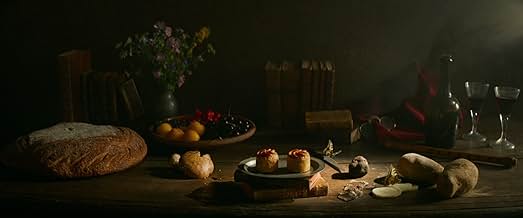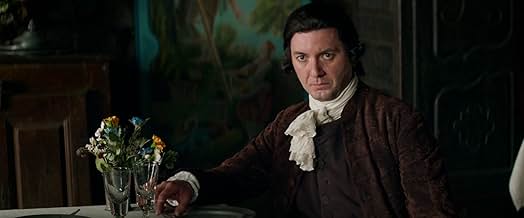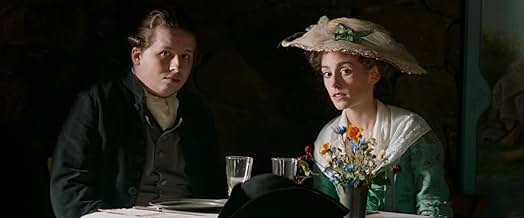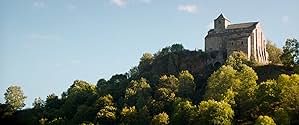PUNTUACIÓN EN IMDb
7,0/10
6,7 mil
TU PUNTUACIÓN
Francia, 1789, poco antes de la Revolución. Con la ayuda de una joven sorprendente, un chef que ha sido despedido por su amo encuentra la fuerza para liberarse de su puesto de sirviente y ab... Leer todoFrancia, 1789, poco antes de la Revolución. Con la ayuda de una joven sorprendente, un chef que ha sido despedido por su amo encuentra la fuerza para liberarse de su puesto de sirviente y abre el primer restaurante.Francia, 1789, poco antes de la Revolución. Con la ayuda de una joven sorprendente, un chef que ha sido despedido por su amo encuentra la fuerza para liberarse de su puesto de sirviente y abre el primer restaurante.
- Dirección
- Guión
- Reparto principal
- Premios
- 3 nominaciones en total
Reseñas destacadas
It's set in 1789 France just before the Revolution in a rural fictional dukedom of Chamfort. It tells the story of the invention of the modern restaurant concept in a time when only the nobility ate well.
Pierre Manceron (Grégory Gadebois) is the master chef for Le duc de Chamfort (Benjamin Lavernhe). Chamfort loves Manceron's cooking, but insists that he stick to set menus and not be creative in his recipes. When Manceron creates a little appetizer he calls "Délicieux" that contains potato, Manceron is dismissed after refusing to apologize for serving such a dish.
He returns to his rural home with his son, Benjamin (Lorenzo Lefèbvre), and together with an elderly mentor, Jacob (Christian Bouilette) runs a relay (postal) station that also serves basic food. Suddenly, a mysterious woman appears and asks to be Manceron's cooking apprentice. Louise (Isabelle Carré) claims to a former jam maker, but Manceron believes she actually must have been a prostitute. He refuses to accept her for a time, but ultimately agrees to train her.
They create dishes based on local produce and local livestock, and begin to attract a significant clientele. The duke is intrigued, misses his cook who he has not been able satisfactorily to replace, and offers to stop by for a traditional feast. If successful he'll invite Manceron back into service.
The film then takes a sharp departure into the pre-Revolution politics of the day, we learn the truth of Louise's background, and the story unfolds in unexpected ways.
This is beautifully-filmed movie. The scenes of food preparation reminded me of "Babette's Feast." The unfolding interaction between Manceron, Benjamin (who is pro-class struggle), and Louise is well done. The sharp departure two-thirds of the way into the movie started to to make it go off the rails for me. I expect minimal plausibility in historical films; this one drifted too far in its link to the French Revolution and ended somewhat unsatisfactorily.
Still, the cinematography and the initial storyline made it a good watch.
Pierre Manceron (Grégory Gadebois) is the master chef for Le duc de Chamfort (Benjamin Lavernhe). Chamfort loves Manceron's cooking, but insists that he stick to set menus and not be creative in his recipes. When Manceron creates a little appetizer he calls "Délicieux" that contains potato, Manceron is dismissed after refusing to apologize for serving such a dish.
He returns to his rural home with his son, Benjamin (Lorenzo Lefèbvre), and together with an elderly mentor, Jacob (Christian Bouilette) runs a relay (postal) station that also serves basic food. Suddenly, a mysterious woman appears and asks to be Manceron's cooking apprentice. Louise (Isabelle Carré) claims to a former jam maker, but Manceron believes she actually must have been a prostitute. He refuses to accept her for a time, but ultimately agrees to train her.
They create dishes based on local produce and local livestock, and begin to attract a significant clientele. The duke is intrigued, misses his cook who he has not been able satisfactorily to replace, and offers to stop by for a traditional feast. If successful he'll invite Manceron back into service.
The film then takes a sharp departure into the pre-Revolution politics of the day, we learn the truth of Louise's background, and the story unfolds in unexpected ways.
This is beautifully-filmed movie. The scenes of food preparation reminded me of "Babette's Feast." The unfolding interaction between Manceron, Benjamin (who is pro-class struggle), and Louise is well done. The sharp departure two-thirds of the way into the movie started to to make it go off the rails for me. I expect minimal plausibility in historical films; this one drifted too far in its link to the French Revolution and ended somewhat unsatisfactorily.
Still, the cinematography and the initial storyline made it a good watch.
Delightful, pure, with great emotional payoff. I thoroughly enjoyed it. A take on aristocracy with French characteristics. Plus points for helping me improve my French listening.
A very nice and pleasant story that puts food and the love of cooking in marvelous light. Good acting, good visuals and some funny moments.
Since this film begins with a history of dining out before the restaurant and is touted as being the story of the first restaurant, let me start by saying I'm an actual food historian. I know not only the REAL history of the first restaurant, but the far lesser known story of eateries before that. This film has NOTHING to do with any of that. It reminds me somewhat of the disastrous "Affair of the Necklace" which took an actual and interesting story featuring an anti-heroine and made it into a banal tale starring an idealized and completely invented heroine. In this case, whatever is going on has nothing to do with any real food history and is something of a hodgepodge of (very appetizing) eating scenes and a basically familiar tale of a lesser-status man resisting power and confronting an aristocrat in a way reminiscent of one of Clint Eastwood's heros in his early films. Almost nothing about the intrigue is credible for anyone who knows the period. For a food historian, there are a few cute touches, starting with the suicide of a "La Varenne" early on. This is kind of an in-joke, since La Varenne wrote the first major cookbook to show the newer approach to French cuisine, but in the previous century. The reference to French fries is casual, but blithely ignores the actual chronology of their appearance in France. Never mind that the first restaurant was established long before the Revolution began to foment. The main story here - delivered carelessly and with little regard for history - is the beginning of the overturn of the Old Regime. But to the degree that that story is told it is in a very metaphorical and allusive way unrelated, again, to actual history. This is basically a lively costume drama with a lot of food.
From the first scene I was delighted by the food and characters. While the movie moves forward you get more and more attached. It's a great, creative story. Contains love, passion and a great narrative.
¿Sabías que...?
- CuriosidadesVery loosely based on true events as the first restaurants in France around 1789 emerged in Paris, not the countryside. Furthermore, the movie is not historically correct either by claiming that the first restaurant was created in France. The modern concept of a restaurant was already happening 600 years before in China circa 1100.
- Créditos adicionalesAt the end of the credits, there is a short clip of a table, with two 'Delicious' set amidst items of food, flowers, wine, etc, while some butterflies flutter about.
Selecciones populares
Inicia sesión para calificar y añadir a tu lista para recibir recomendaciones personalizadas
- How long is Delicious?Con tecnología de Alexa
Detalles
Taquilla
- Presupuesto
- 5.000.000 € (estimación)
- Recaudación en todo el mundo
- 8.371.523 US$
- Duración
- 1h 52min(112 min)
- Color
- Relación de aspecto
- 2.39 : 1
Contribuir a esta página
Sugerir un cambio o añadir el contenido que falta






























